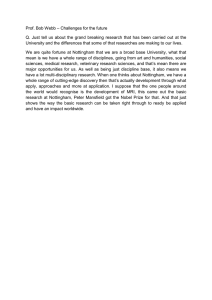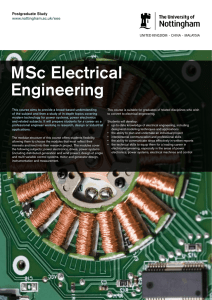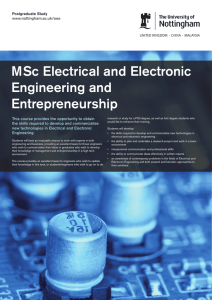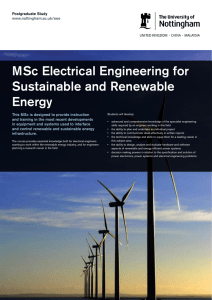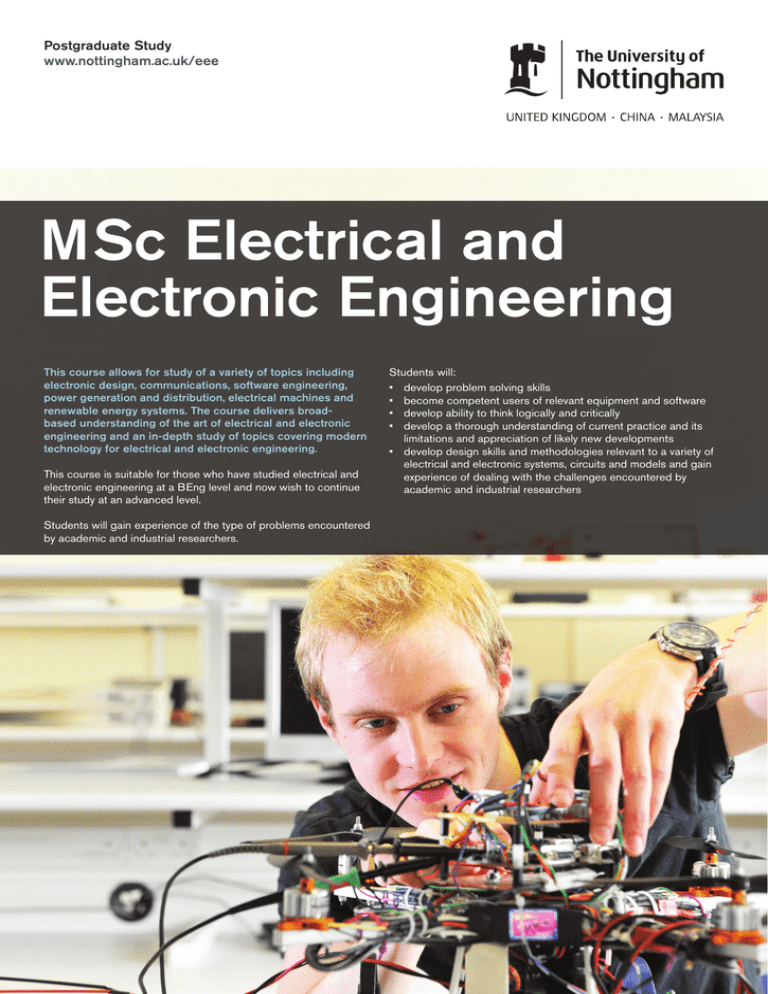
Postgraduate Study
www.nottingham.ac.uk/eee
MSc Electrical and
Electronic Engineering
This course allows for study of a variety of topics including
electronic design, communications, software engineering,
power generation and distribution, electrical machines and
renewable energy systems. The course delivers broadbased understanding of the art of electrical and electronic
engineering and an in-depth study of topics covering modern
technology for electrical and electronic engineering.
This course is suitable for those who have studied electrical and
electronic engineering at a BEng level and now wish to continue
their study at an advanced level.
Students will gain experience of the type of problems encountered
by academic and industrial researchers.
Students will:
• develop problem solving skills
• become competent users of relevant equipment and software
• develop ability to think logically and critically
• develop a thorough understanding of current practice and its
limitations and appreciation of likely new developments
• develop design skills and methodologies relevant to a variety of
electrical and electronic systems, circuits and models and gain
experience of dealing with the challenges encountered by
academic and industrial researchers
Postgraduate Study
www.nottingham.ac.uk/eee
MSc Electrical and Electronic Engineering
Course structure
This course is taught on a full-time basis over one year and consists
of 120 credits of taught modules and a 60 credit independent
research project. Students will take optional modules from across the range
of electrical and electronic engineering topics.
Examples of modules
• Control Systems Design
• Electronic Design
• IT Infrastructure
• Power Electronic Design
• Telecommunications Electronics
• Bioelectronic and Biophotonic Interfacing
• HDL for Programmable Logic with/without project
• Photonics Communications Components
• RF Microelectronics with/without project
• Power Electronics Integration
• Advanced Electrical Machines
• Advanced AC Drives with/without project
• Power Systems for Aerospace, Marine and Automotive Applications
• Advanced Power Conversion
• Technologies for Wind Generation
• Technologies for the Hydrogen Transport Economy
Individual project
Following the successful completion of the taught modules, an
individual research project is undertaken during the summer term.
The project will demand the completion of a major piece of work on
an advanced technical topic.
Example project titles:
• Control of an Uninterruptible Power Supply using FPGA
• Analysis of Household Appliance Load Signatures for Monitoring of
Vulnerable Adults
• Smart phone application for remote data logging and control
• Electromagnetic modelling of nano-materials for bio-sensing applications
• Design of communications and control systems in a more electric aircraft
Funding opportunities
Funding options can be found at:
Home and EU: www.nottingham.ac.uk/fundingPG
International: www.nottingham.ac.uk/internationalstudents/scholarships
Employment prospects
This programme equips graduates with the skills suitable for a wide range
of careers in UK and international organisations and for the pursuit of a
research path in electrical and electronic engineering.
Entry requirements
Applicants should have at least a high 2.2 (high lower second class honours
degree) or international equivalent with accreditation from a recognised
body in a related subject from a recognised university.
English language requirements:
• IELTS score of at least 6.0 with a minimum score of 5.5 in individual
elements
Other qualifications are accepted.
How to apply
Candidates are encouraged to apply online at:
www.nottingham.ac.uk/pgstudy/apply
Contact us
For further information, please contact:
Graduate admissions
Department of Electrical Engineering
t: +44 (0)115 95 13134
e: eng-student-support@nottingham.ac.uk
w: www.nottingham.ac.uk/eee
The University of Nottingham has made every effort to ensure that the information in this
brochure was accurate when published. Please note, however, that the nature of the
content means that it is subject to change from time to time, and you should therefore
consider the information to be guiding rather than definitive. You should check the
University’s website for any updates before you decide to accept a place on a course.
© The University of Nottingham 2015. All rights reserved.

